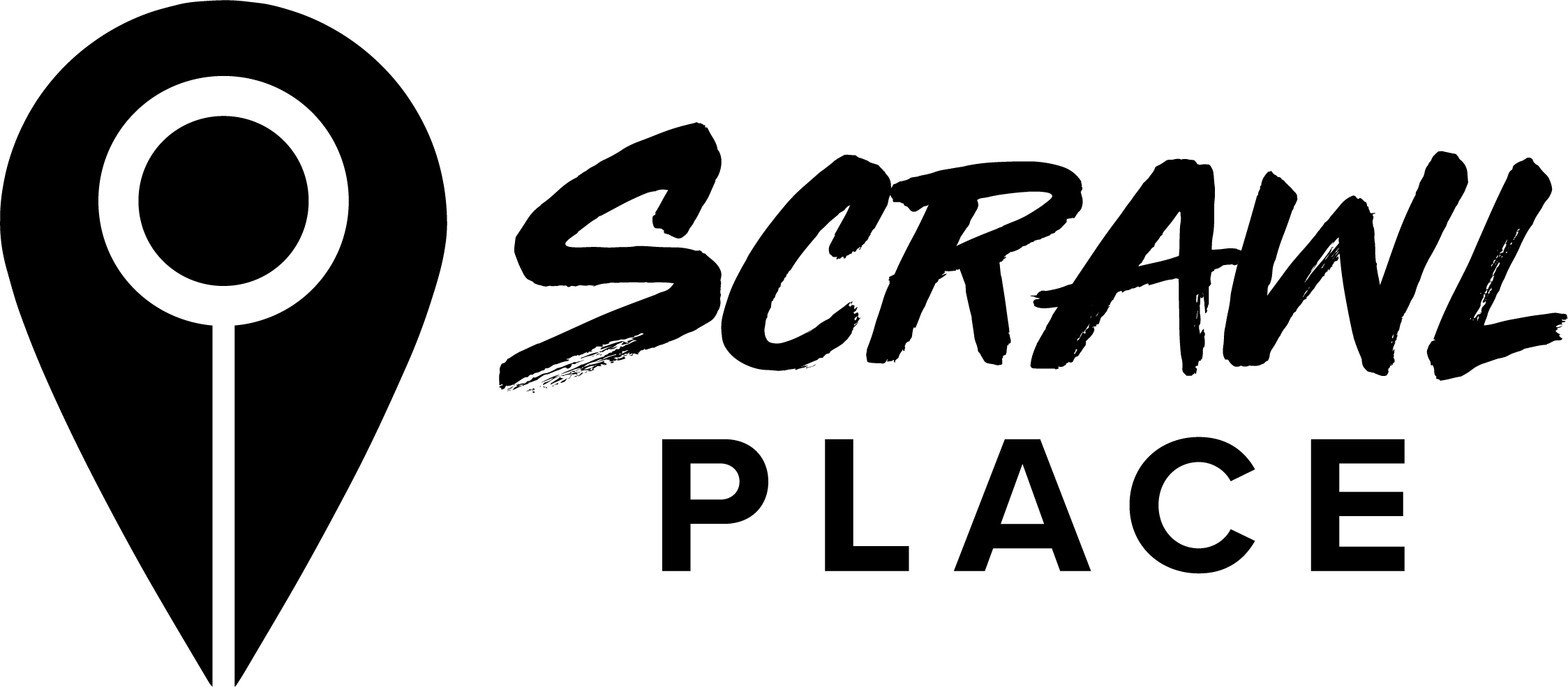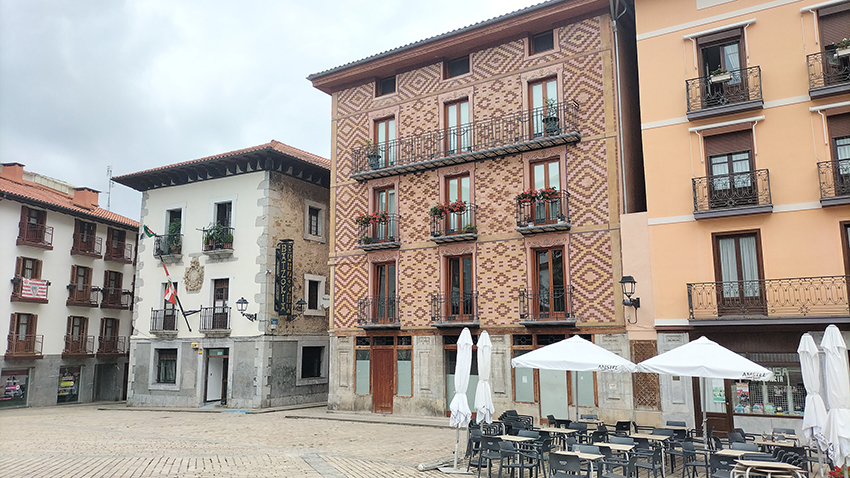Photo: Ibai1984 via Wikimedia Commons. License: CC BY-SA 4.0
We’re hiking 25km uphill in a downpour and Mom’s in a mood. Day three on the Camino. No matter what sort of scale the map shows for our route, the reality of the elements doesn’t hit us until it really hits us. The mountainous footpath is so narrow that we need to watch our steps to keep from sliding in the mud. I’m using muscles that I never knew existed before while contending with a middle-aged grump.
It wasn’t my idea to go backpacking across Spain. I mean, I was content to spend the month playing Call of Duty and hanging out on Discord while Mom went away. But I didn’t hear the end of it until I agreed to go along. It was all she talked about. “Camino” this, and “The Way” that. When the world finally opened up again after the lockdowns, she said this was our chance to go on a spiritual journey. I said I’ve got Xbox for that sort of thing.
“I’ll stay home,” I argued. “I’m supposed to be job-searching anyway.” Which is true. I’ve been trying to get out on my own for years now, but I keep getting thrown back. First, it was the university sending us all home for Zoom classes. What was supposed to be two weeks of remote learning transformed into two years. Then, it was because affordable apartments evaporated overnight. I have nowhere to go. Mom’s basement isn’t my first choice of refuge–it’s my only one. But better if she’s not home. Let her go on the big pilgrimage.
“Think of it,” Mom kept bleating, “a real life’s quest. Not just a game, Bertie.” If it’s so magical, then why couldn’t she just go with her drum circle women? Or those other moms she does yoga in the park with? They’re all into that self-discovery nonsense.
Why me?
“It’ll be good for you,” she persisted.
A full month of hiking with this woman. What could go wrong?
We got held-up in Toronto thanks to Mom’s umbrella. The one she insisted on shoving into my carry-on pack before checking-in at Pearson Airport. It set off alarms. Security went nuts and got out the swabs and ordered me to open my bag, remove my shoes—the whole lot. They enclosed me in one of those x-ray vision tubes while inspecting her fold-up umbrella like it was a landed UFO. So naturally, it got confiscated for having sharp edges.
When I was finally clear, I found her waiting on the other side of the glass partition for me to emerge. She should have listened to me when I told her an oversized poncho would do just fine for our needs on the trail. They fold up tiny enough for your pocket, weigh almost nothing, and dry super fast. You just plop it on top of you, backpack and all. And the best part: it glides through airport security without any issues.
But did I gloat about it? No way. Besides, I’m the one they flagged. That didn’t stop her from yelling at me, though. Well, first she took it out on my shoes, trying to tie them back on in a hurry. Then by fussing over my bag’s straps, saying they’re too thick. And then on me when I waved her off.
Mom made it even more of a mission to speed through the trail once we landed in San Sebastián. After hurrying along the coastline for two days, Mom began waddling by the outset of day three. And that’s when the rain started up. As a thanks for spreading my poncho over her, she insisted we could make it the full way to Markina that afternoon. And of course this is where coastline becomes mountain. Better than Xbox? I think not.
When we finally reach what appears to be civilization again, we begin the evening search for an open albergue—that’s a hostel for pilgrims on the Camino. The first one we find is closed. Booked up. We can’t even ask for supper—full. So we’re forced to continue walking in search of shelter for the night. My mother is full-on hobbling at this point and beyond speaking. Which, really, is for the best because I’m past listening to her voice.
We try the last albergue in Markina and this one’s full too. We must look pathetic, though, because the Spaniards running it wave us in anyway. Maybe there’s no bed, but at least we’ve got shelter. Mom takes her time in the shower stall changing her clothes.
I unlace my boots and peel the soaked wool socks off my feet to inspect my blistered toes. As I’m wringing out my footwear and pulling the shower sandals out of my pack, a tall man with a short dark beard pokes my shoulder with his walking staff.
“Buen Camino,” he says. It’s a greeting among pilgrims in Spanish.
“Buen Camino.” My throat is dry and catches on the sounds.
“She will have a bed,” he says simply and nods toward Mom who just emerged from the showers in her dry clothes and is fussing about a rash on her thighs. He indicates an open bed in the far corner of the dormitory and I roll her sleeping mat over top and set our packs down. Hers has coloured ribbons poking out at all sides and “Maeve” written in black sharpie.
She tried writing “Bertrand” on mine before we left for the airport and I stopped her mid-scrawl. So it says “Be” in huge lettering against the otherwise pristine canvas.
My mother lands on the bed with a click-clack of settling knees, spine, and shoulders. She slaps a cloth across her eyes and is snoring before I’ve made my exit from the dormitory. By the albergue’s doors, the bearded man is holding court with a group of guys—all of different shapes, shades, and postures. They’re bright eyed despite worn skin and swollen joints. Outside, heavy clouds spill into the oak trees below. Tall grass and laurel leaves whip and twirl. The horizon is a single band of red where the sun has just gone down. I crouch against the wall alongside the men. A tiny lightbulb just inside the main doorway throws shadows across the floor.
“Your first time,” says the bearded man. He means walking the Camino. Staying up late at night isn’t new to me. I’ve done it many times. But never when I had a full day of hiking both behind and ahead of me. And not with my mother as a travel companion. No. Correction: I’m her companion. It’s her walk.
“My mother’s idea.” I felt the need to clarify, “it’s her big pilgrimage. I’m just here for support.” There’s a low chuckling sound from the group.
“Name’s Jim,” says the bearded man.
“I’m Bertrand,” I say, feeling awkward I didn’t introduce myself earlier. I ask where he’s from and he answers that he’s always on the move.
“Help where I can,” he says vaguely.
“I came along to help her,” I say. “But she keeps pushing like I’m not doing enough.”
One man distributes plump orange wedges among us. Its tartness wards off the heaviness behind my eyes. Another man clicks a pocket knife open and begins halving avocados.
“The Camino,” Jim cuts in, “sorts things out for you. So they say.”
“My mother seems to think so. She said there’s magic here. We’re supposed to find it?”
Jim takes a deep breath, clears his throat, and then continues, “People expect that. It does not happen. Not in that way.”
“On the plane, she kept telling me,” I add, “that we’re here for a purpose. But so far it’s just felt like hard work.” I shift to a cross-legged position on the floor and flex my blistered toes. They sting.
“Mm-hmm.” Jim picks at a hand callus. “Work,” he says, “with purpose. It brings life.”
One of the men extends a sun-worn arm in my direction and plunks a sliver of avocado into my palm. It melts in my mouth like butter. Our collective weariness is replaced with a sense of manly pride. It feels as though we’re guarding the sleeping pilgrims from some unknown threat outside this door. My mother is one of those sleeping pilgrims inside the dormitory. Exhausted from driving us both so hard on this trip. Maybe the threat isn’t so much out there as it is in here. Inside each one of us. Mom’s no exception.
“You’ve got work here,” Jim says, staring deep as though he were reading something in my face that only he could see. “With purpose.”
We eat more fruits along with some almonds. A bottle of wine emerges from somewhere and gets passed around. Its rosy liquid warms my throat. My knotted shoulders relax a little and begin to forget having to bear the weight of my pack. How has my mother managed to carry hers for three full days on this trail? And there’s weeks to go yet.
“So my work is to help my mother?” I ask, feeling more confused than before.
“How to help,” Jim replies, “without first seeing burden?” He turns away and begins speaking with the other men in Spanish, leaving me to my thoughts for a while.
Burden? I think I’ve been helping her. But she thinks she’s helping me. Our best intentions have been at cross purposes.
There’s a dim light outside the window now. It’s dawn already and the sky is clear. Each man stands up, stretches, and heads outside. I follow them into the cool dewy air.
“Now look,” says Jim pointing to the east to where the Camino’s trail led us into town.
“You came from there,” he says, then swings his arm the opposite direction. He points out a signpost with a single scallop shell. It’s the symbol for pilgrims following the Camino de Santiago. “So, you head this way.” Then he adds, “Unless you want to go back.”
I say nothing in response.
Jim wheels his arm around again and points due east where the sun’s bright disk is cresting over the horizon. “What does it mean?”
Uncertain of what he’s asking, I say the first thing that springs to mind, “Sunrise.”
I guess that wasn’t it ’cause he continues to point. I try again, “Dawn?” Nothing.
I think for a minute. Okay, how about… “A new beginning!”
Jim nods and extends his fingers as though he were reaching for the sun itself. He takes a breath and looks me in the eyes.
“New,” he says, “but it is the same sun.” He gathers up his walking staff, flicks the brim of his hat, and turns west.
“It is your walk,” he calls, “Buen Camino.”
Pauline Shen’s work aims to highlight beauty and truth. Her stories showcase strength and unity in the face of countless forces that pull us apart. Her writing and visual art is published with Amethyst Review, Blank Spaces, Cool Beans Lit, Dreamers Creative Writing, and Quibble Lit. Pauline is located in London, Ontario. Follow her blog at paulineshen.ca and on X (Twitter)

